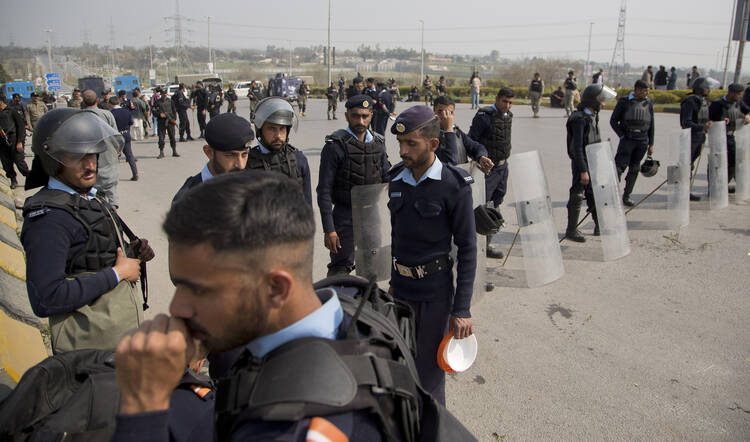Pakistan on Monday hanged the convicted killer of a former governor, shot in 2011 by his bodyguard who accused him of blasphemy, officials said.
The execution triggered protests in several cities denouncing the hanging after some religious and political leaders, as well as militant groups, publicly defended the killer.
Most schools closed down Monday in the capital, Islamabad, and the nearby garrison city of Rawalpindi in fear of violence by supporters of the executed former police officer Mumtaz Qadri.
Qadri's supporters blocked roads and burned tires, and many shopkeepers shuttered their stores. In some places, the protesters demanded the store owners close their businesses, said police official Sohail Ahmad. In Qadri's hometown of Rawalpindi, a mob ransacked a vehicle belonging to a local TV channel and attacked reporters, and in the port city of Karachi, his supporters briefly skirmished with police.
Qadri was on guard duty for secular Gov. Salman Taseer who was campaigning in support of a Christian woman jailed for years on accusations of blasphemy for allegedly desecrating Islam's holy book, the Quran.
Taseer had called for reforms of the country's harsh blasphemy laws, which impose the death sentence for insulting Islam. The laws are often misused against both Muslims and religious minorities to settle rivalries. Qadri, who repeatedly shot Tasser at a marketplace, later told authorities he killed the governor because he spoke out against the blasphemy laws.
The January 2011 assassination horrified Pakistan's relatively small liberal elite. However, many Pakistanis, including some in the religious establishment and in legal circles, praised Qadri—a sign of the spread of Islamic fundamentalist thought in this South Asian nation.
Qadri was convicted and sentenced to death in an anti-terrorism court in Rawalpindi later that year. He was hanged Monday in Rawalpindi, after all his petitions and mercy appeals were rejected, said police official Sadiq Mahmood.
Though the blasphemy laws allow for anyone convicted of insulting Islam or the Prophet Muhammad to be sentenced to death, people often take the law into their own hands, with lynchings on the streets and killings of those accused of blasphemy. No Pakistani leader has ever succeeded in amending those laws amid fears of retributions from right-wing political and religious parties and extremist militant groups.
Pakistan lifted a moratorium on the death penalty after a Taliban school attack in December 2014 and has executed over 300 convicts since then.
___
Associated Press Writers Asim Tanveer in Multan and Zaheer Babar in Lahore, Pakistan contributed to this report.
Copyright 2016 The Associated Press. All rights reserved. This material may not be published, broadcast, rewritten or redistributed.








